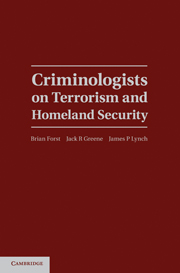Book contents
- Frontmatter
- Contents
- About the Authors
- Preface
- 1 Introduction and Overview
- PART I NATURE OF THE PROBLEM
- 2 Manifestations of Aggression
- 3 The Etiology of Terrorism
- 4 Balancing Counterterrorism Strategies
- 5 Gangs, Crime, and Terrorism
- 6 Women Terrorists
- PART II STRATEGIES FOR INTERVENTION
- PART III THINKING ABOUT TOMORROW
- Index
- References
4 - Balancing Counterterrorism Strategies
Lessons from Evolutionary Ecology
Published online by Cambridge University Press: 04 February 2011
- Frontmatter
- Contents
- About the Authors
- Preface
- 1 Introduction and Overview
- PART I NATURE OF THE PROBLEM
- 2 Manifestations of Aggression
- 3 The Etiology of Terrorism
- 4 Balancing Counterterrorism Strategies
- 5 Gangs, Crime, and Terrorism
- 6 Women Terrorists
- PART II STRATEGIES FOR INTERVENTION
- PART III THINKING ABOUT TOMORROW
- Index
- References
Summary
INTRODUCTION
Terrorism often is portrayed as fundamentally different from more mundane types of crime. This distinction is understandable, but unwarranted and counterproductive because it encourages over-reliance on aggressive measures to combat terrorism. We believe that a true understanding of the causes of terrorism can occur only if we apply the same systematic, scientific approach to the problem that is used to study other forms of behavior, and that an understanding of the root causes of terrorism is necessary for the development of effective counterterrorism policies.
In this chapter, we discuss terrorism using the same evolutionary- ecological perspective on human behavior that has proved useful for understanding crime and developing novel approaches to crime control and prevention. Unlike more traditional approaches to these social problems, the evolutionary-ecological perspective deals systematically with biological, social, and cognitive factors that influence human development over the life course at both micro and macro levels. It also explains why effective long-term crime control strategies must strike a balance between opportunity reduction, deterrence, and developmental interventions. The following discussion places terrorism within an evolutionary-ecological framework and proposes a suite of theoretically driven counterterrorism policies. Using a game-theoretic model, we demonstrate that terrorism can best be controlled using the same balanced approach that is most effective for countering other types of crime. We argue that over-dramatizing terrorist threats and over-emphasizing punitive and protective counter-strategies without addressing the root causes of terrorism is counterproductive and cannot succeed in the long run.
- Type
- Chapter
- Information
- Criminologists on Terrorism and Homeland Security , pp. 66 - 96Publisher: Cambridge University PressPrint publication year: 2011

